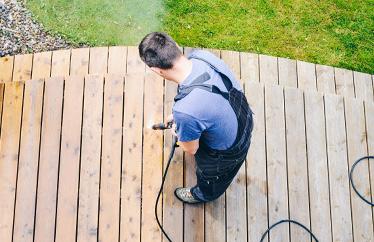Tips to Avoid Fall Floods

Most people live in an area with at least some flood risk, but as climate change worsens, the risk for homeowners is increasing during our seasonal changes. Not only is flooding one of the most common natural disasters in the United States, but it’s also one of the most costly. In some cases, just one inch of water can cause $25,000 in damages to your home.
To prevent flood damage, it’s crucial to be proactive. Here are our eight tips for protecting your home during flood season—and all year long.
1. Determine your risk level
The sooner you prepare for a potential flood, the better. If you were in your home last year, you probably know what kind of weather to expect, but if you’re new to your area you might need to brush up on the basics.
Start by doing some research on your area’s typical weather patterns during the fall and winter seasons. You can consult your neighbors, reach out to your homeowner’s association or talk to the previous owners of your home.
From there, take advantage of smart tools to better assess your risk. The Federal Emergency Management Agency (FEMA) is a great resource to find out whether or not you live on a flood plain. You can check out the FEMA Flood Map Service Center to learn about your home’s individual risk and determine your Base Flood Elevation (BFE), which tells you how high the water can rise when it floods in your area.
2. Inspect for the unexpected
If you haven’t inspected your home since you moved in, it’s time to do a maintenance check. Homeowners that complete their own home inspections annually—and before severe weather seasons—benefit from a safety and insurance perspective: not only can you provide up-to-date information about your home and its belongings to file a claim if needed, you can also adjust your coverage so you’re never over or under-insured.
To inspect your home, start from the top with the roof and ceiling), then work your way down to the foundation and basement. If you need help, consider Hippo Home Care, a complimentary home maintenance service for Hippo customers.
3. Get smart
Believe it or not, technology can help safeguard your home against floods. There are Smart home devices designed specifically to alert you to potential water damage. Whether it’s a water sensor sent by one of Hippo’s smart home partners or a sophisticated solution like the Flo device, these devices can help you save thousands of dollars in home damage. From small sensors you can place in leak hot zones to electric automated water shut-off valves, you can customize your smart home protection to ensure maximum preservation and safety.
4. Move it up and lock it away
Whether or not your local forecast predicts a flood, get in the habit of storing as many of your valuables as possible in the highest points of your home. Think: attics, upper floors or high garage shelves.
It’s also a good idea to research the best way to store your various items to prevent water damage. You may want to invest in waterproof storage containers, especially for important, irreplaceable documents. Waterproof safes or lockboxes can keep your valuables safe and dry.
Pro tip: Make copies of important documents and store them somewhere outside your home. Better yet, scan copies of your papers onto your computer and upload them to a digital cloud, so you always have access to them.
5. Prepare an emergency kit
It’s critical to have a customized emergency kit on hand at home. Depending on the severity of a flood, you may need to stay inside your home or evacuate quickly for your safety. Not sure where to start? Download our template for assembling an effective emergency kit.
Once you gather your items, bring your household together to go over the items in the kit, designate a place to put it and discuss emergency scenarios.
6. Flood-proof your basement
If you have a basement, low home storage or a crawl space under your home, make it a priority to flood-proof that space. These out-of-sight, barely used areas can quickly become a nightmare in a normal fall storm, let alone during flash flood weather. Consider taking the following steps:
- Seal walls with a waterproofing compound.
- Elevate or flood-proof any appliances, furnaces, water heaters and/or other utilities at least 12 inches above the BFE.
- Replace carpeting with tiles or another flood-resistant material.
- Install flood vents to allow water to flow through.
- Invest in flood-resistant insulation and drywall that you can easily clean and sanitize.
7. Get a sewer reviewer
Your sewer system isn’t something that typically comes up in polite conversation, but as a homeowner, it’s helpful to normalize talking about this crucial system, especially when it comes to extreme weather readiness. After all, even the slightest sign of flooding can cause sewage to back up through the drain pipes and contaminate your home. If this is your first year in your home, consider consulting a plumber for proper flood preparation assessment and fixes. You can also invest in a sewer backflow valve to prevent a potential health hazard as a result of flooding.
8. Check your home insurance
Your standard home insurance policy is meant to be a comprehensive plan to protect you and your home, but there can be gaps in coverage. Depending on the state you live in, certain natural disasters like floods require a specific endorsement or rider on your existing policy.
That’s why it’s crucial to have a relationship with your home insurance company. Your insurance company can assess your home insurance coverage and help ensure your home is set up for success in the case of any flooding or potential water damage.
Preparing for a flood can be stressful, but we’re here to help lighten your load. As a member of the Hippo family, you can get in touch with our customer support agents 24/7. Any homeowners can also take advantage of Hippo Home to help double down on your home’s flood safety.
Not yet a Hippo customer? Give us a call, or get an instant 60-second quote to see what modern insurance can do for you.



